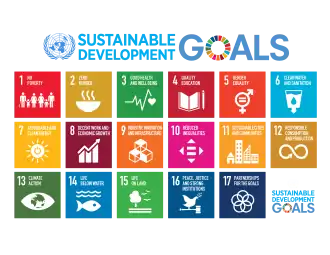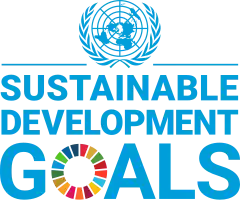Sustainable Development Goals and Nigeria
Sustainable Development Goals and Nigeria is about how Nigeria is implementing the Sustainable Development Goals within the thirty-six states and its Federal Capital Territory (FCT), Abuja. The Sustainable Development Goals (SDGs) consists of seventeen global goals designed as a "blueprint to achieve a better and more sustainable future for all". Each of the 17 goals is expected to be achieved by 2030 in every country around the world.
| Sustainable Development Goals and Nigeria | |
|---|---|
 | |
| Mission statement | "A blueprint to achieve a better and more sustainable future for all by 2030" |
| Commercial? | No |
| Type of project | Non-Profit |
| Location | Global |
| Owner | Supported by United Nation & Owned by community |
| Founder | United Nations |
| Established | 2015 |
| Website | sdgs |
In 2017, Nigeria was among 44 member countries of the United Nations that presented its Voluntary National Review (VNR) on the implementation of the SDGs at High-Level Political Forum on Sustainable Development.[1] In 2020. Nigeria was ranked 160 on the 2020 world's SDG Index.[2] The government affirmed that Nigeria’s current development priorities and objectives are focused on achieving the SDGs.[3]
Background
Nigeria is a member of the United Nations. Nigeria is known as the "Most populous nation in Africa and the Seventh most populous in the world."[4] Nigeria gained her independence on October 1, 1960. In 2012, Nigeria contributed the fifth largest number of peacekeepers to United Nations peacekeeping operations.[5]
The SDGs or the Agenda 2030 are the global call to action to end poverty, secure the planet and ensure that everyone enjoys peace and prosperity by 2030. It was adopted by 193 countries with Nigeria as one of its country members. The SDGs are set of seventeen interconnected goals which have targets with at least one or two indicators for each targets. The implementation of "Global Goals" for all kicked off in January, 2015. Its objectives are to ensure social inclusion, protect the environment and foster economic growth. Governments, private sector, research, academia and CSOs receive support from the UN as the SDGs encourage partnerships. It ensures the right choices are adopted now to improve life for future generations in a sustainable way. The SDGs are blueprints for the world to experience peace and prosperity at the fullest by 2030.
According to the agreement of Nigerian with the United Nations, aims to align its development priorities in partnership with CSOs and the private sector to achieve the SDGs together. The Agenda 2030, is designed to build sustainable world around the five P's, namely; People, Planet, Prosperity, Peace, and Partnerships, which span across the 17 SDGs. In 2017, Nigeria was among 44 member countries of the United Nations that presented its Voluntary National Review (VNR) on the implementation of the 2030 agenda and the SDGs at HLPF.[1]
Reporting structures
Since the year 2017, Nigeria has volunteered to be among the countries to review the progress of the 2030 Agenda.[6] Voluntary National Review (VNR) presentations are annual reviews presented to the UN High Level Political Forum on Sustainable Development (HLPF). Nigeria was among 44 member countries of the United Nations that presented its Voluntary National Review (VNR) on the implementation of the 2030 agenda and the SDGs at HLPF.[1]
In 2020, Nigeria also volunteered with other 46 countries for VNR. ''Nigeria's 2020 VNR on SDGs focuses on poverty (SDG-1), inclusive economy (SDG-8), health and wellbeing (SDG-3), Education (SDG-4), gender equality (SDG-5), enabling environment of peace and security (SDG-16) and partnerships (SDG-17).''
The focus areas are based on President Buhari's current development priorities and objectives. "The report was given in spite of the covid-19 Pandemic which is believed to slow down the progress of the 2030 Agenda."[7]
Performance
2020 Voluntary National Review (VNR)
In July 2020, President Muhammadu Buhari presented the report at the HLPF's second panel session, online for the first time due to the COVID-19 pandemic. He gave the progress of seven of the SDGs which are referred to as core to the country at large.[7]
Financing
On July 1, 2020 Nigeria officially commenced the process of designing and implementing an Integrated National Financing Framework (INFF) for financing national development priorities and achieving the SDGs.[8] The integrated National Financing Framework (INFF) is a United Nations initiative to support countries in operationalizing the agreements of the Addis Ababa Action Agenda (AAAA) for financing the SDGs. UNDP has been supporting the government and its people by addressing development challenges, strengthening and building institutions that promote inclusive sustainable development and democratic governance.[9] For example, during the COVID-19 crisis, UNDP partnered with Japan to support Nigeria's health and socio-economic response.[10]
Challenges
The year 2020, which is referred to as "Decade of Action" is said to have slow progress regards the progress of SDGs as reported by President Muhammadu Buhari during Nigeria's 2020 Voluntary National Review (VNR)." The focus of the report was on issues of poverty (SDG-1) and an inclusive economy (SDG-8), health and wellbeing (SDG-3), Education (SDG-4), Gender equality (SDG-5), and the enabling environment of peace and security (SDG-16), and partnerships (SDG-17).[1]
Society and culture
Higher education
University of Ibadan Centre for Sustainable development (CESDEV). The Centre was established by the University of Ibadan as a demonstration of the University's commitment to Sustainable Development.[11]
Organizations
These are the list of organizations accelerating SDGs in Nigeria:
- UNDP in Nigeria[12]
- International Climate Change Development Initiative
- Australian High Commission Nigeria
- Teach SDGs
References
- "FG presents SDGs voluntary national review report to UN today". Guardian Nigeria. Retrieved September 24, 2020.
- "Sustainable Development Report 2020". dashboards.sdgindex.org. Retrieved 2020-09-23.
- "THE GOVERNMENT OF NIGERIA PRESENTS 2ND VOLUNTARY NATIONAL REVIEW ON SUSTAINABLE DEVELOPMENT". Sustainable Development Goals. 2020-07-28. Retrieved 2020-09-23.
- "The Most Populated Countries In Africa". World Atlas. Retrieved September 24, 2020.
- "General Assembly of the UN General Debate-H.E. Mr. Goodluck Ebele Jonathan, President (Nigeria)". GATEBATE UN. Retrieved September 24, 2020.
- "VNR Compilation Highlights National SDG Progress and Challenges". SDGs Knowledge Hub. Retrieved September 24, 2020.
- "Nigeria's 2020 Voluntary National Review (VNR) on SDGs" (PDF). SDGs UN. Retrieved September 23, 2020.
- "Nigeria Kick-starts the Design of a National Integrated Financing Framework to Accelerate the Sustainable Development | UNDP in Nigeria". UNDP. Retrieved 2020-09-23.
- "UNDP in Nigeria". UNDP. Retrieved 2020-09-23.
- "COVID-19 crisis: Japan partners with UNDP to support Nigeria's health and socio-economic response | UNDP in Nigeria". UNDP. Retrieved 2020-09-23.
- "University of Ibadan Centre for Sustainable development (CESDEV)". CESDEV. Retrieved September 24, 2020.
- "United Nations Development Programme Nigeria (UNEP in Nigeria)". Nigeria UNDP. Retrieved September 24, 2020.
